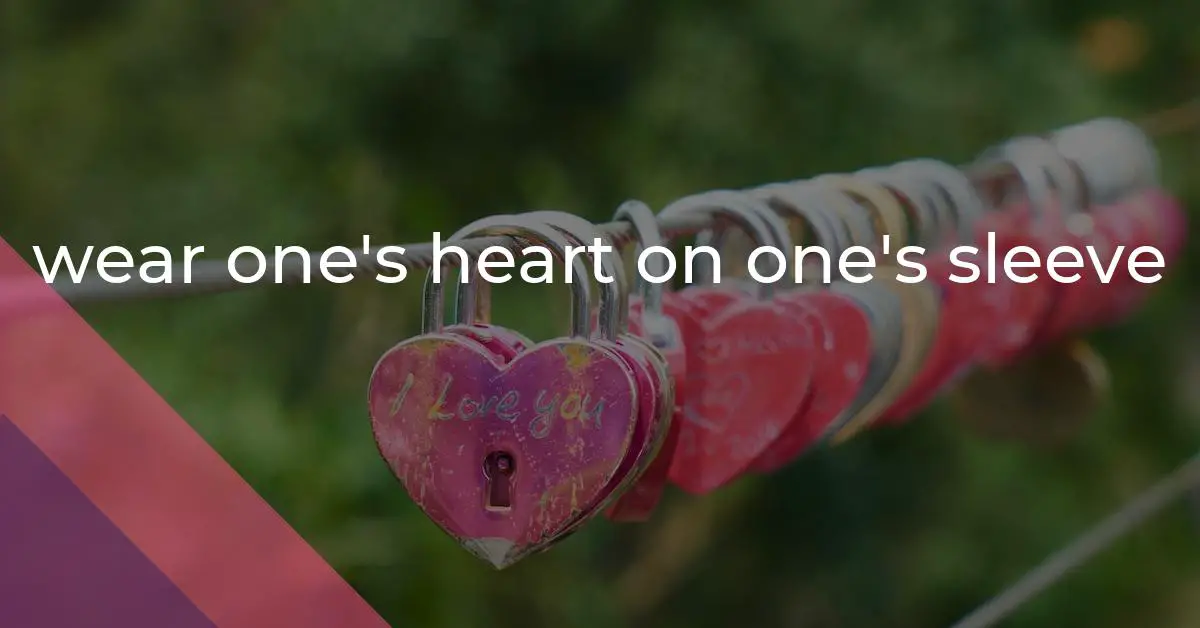wear one’s heart on one’s sleeve: Idiom Meaning and Origin
What does ‘wear one's heart on one's sleeve’ mean?
The idiom wear one's heart on one's sleeve means to openly display one's emotions or feelings, often in a vulnerable or transparent manner.

Idiom Explorer
The idiom "up one's sleeve" means to have a secret plan or strategy, usually hidden until the right moment.
The idiom "under one's hat" means to keep something a secret or to refrain from sharing information with others.
The idiom *the shirt off one's back* means to be willing to give someone everything one has, even if it means sacrificing one's own possessions or well-being.
The idiom "spill one's guts" means to confess or reveal something very personal or private, often in an emotional or dramatic way.
The idiom "speak one's mind" means expressing one's opinions or thoughts honestly and openly without hesitation or fear of consequences.
The idiom "someone's heart is in" expresses strong dedication and passion towards something or someone.
The idiom "sleeves from one's vest" means revealing one's true intentions, usually in a manipulative or deceitful manner.
The idiom "set one's heart on" means to strongly desire or be determined to achieve something. It implies a deep emotional attachment and commitment towards a particular goal or outcome.
Meaning Unveiled: Heartfelt Displays
Wear one's heart on one's sleeve is a commonly used English idiom. It means openly displaying one's emotions or feelings without trying to hide or conceal them. This phrase dates back to the late 16th century and is often used to describe someone who is honest and open about their emotions.
One possible origin of this idiom is linked to the fashion trends of the Renaissance period in Europe. During this time, wealthy individuals would proudly display their coat of arms or family crest on the sleeves of their clothing. This display of identity may have influenced the association of wearing emotions openly with the phrase "wear one's heart on one's sleeve."
Another possible origin can be traced back to the world of theater. In Elizabethan dramas, actors would use different colors on their costume sleeves to indicate specific moods or states of mind. This visual representation of emotions may have contributed to the idiom's meaning of openly displaying one's feelings.
Over time, the idiom "wear one's heart on one's sleeve" has become widely used in both formal and informal contexts. It can be found in various forms of literature, poetry, and contemporary language. The idiom has been adopted and integrated into different cultures and languages, highlighting its universal appeal and relevance.
The phrase "wear one's heart on one's sleeve" carries a message of authenticity, vulnerability, and emotional transparency. It suggests a willingness to express oneself honestly and openly, without fear of judgment or rejection. However, the idiom also implies a certain level of risk, as individuals who openly display their emotions may be more susceptible to emotional turmoil or heartbreak.
The idiom "wear one's heart on one's sleeve" offers a reflection on the complex nature of human emotions and the choices individuals make in expressing or concealing them. It invites the audience to consider the merits of emotional openness and the impact it can have on personal relationships and perceptions.
The idiom has deep historical roots and has evolved to become a symbol of emotional transparency in modern language. Its association with fashion and theater adds depth to its meaning and highlights the importance of self-expression. The idiom serves as a reminder of the power and vulnerability inherent in being open and honest about one's emotions.
Related Idioms:
Similar to "wear one's heart on one's sleeve," the idiom "bare one's soul" also emphasizes emotional transparency and openness. It refers to revealing one's deepest and most personal thoughts or feelings to someone else. When someone bares their soul, they are sharing their innermost emotions, vulnerabilities, and experiences without holding back.
The idiom "hearts on sleeves" is related to "wear one's heart on one's sleeve" and carries a similar meaning. It describes individuals who openly express their emotions and wear their heart on their sleeve figuratively. They do not try to hide or conceal their feelings, but instead, allow their emotions to be visible to others.
Example usage
Examples of how the idiom "wear one's heart on one's sleeve" can be used in a sentence:
1. Sarah is known for wearing her heart on her sleeve, she openly expresses her emotions without hesitation.
2. John couldn't hide his excitement when he received the promotion, he wears his heart on his sleeve.
3. Despite the disappointment, Emily still wears her heart on her sleeve and remains optimistic about finding love.
More "Emotions" idioms



